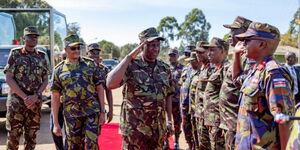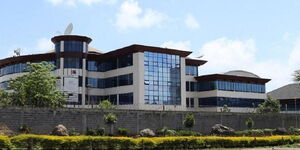The government spends billions of shillings in securing the country and preventing terror attacks from happening. In most of his speeches, President Uhuru Kenyatta has consistently reiterated Kenya’s devotion in fighting violent extremism and safeguarding its citizenry.
In his State of the Nation Address on Tuesday, November 30, President Kenyatta told the Parliament that his administration heavily invested in modernisation and expansion of the military and other security agencies.
“In fact, the reform undertakings in the military are unparalleled in our nation’s history. We have invested substantially in military manufacturing capabilities,” he stated, adding that he had transformed Kenya’s security sector.
“To give one example, the police to population ratio is at its highest level ever and is even higher than the UN prescribed standard. We did this because my administration appreciated that to have freedom from fear, our security sector has to be in good form.”
Leading in line in countering terrorism is the National Counter Terrorism Centre (NCTC). This is a multi-agency institution that was established by the Prevention of Terrorism Act (POTA) on October 24, 2012.
NCTC coordinates national counter-terrorism measures in order to prevent, detect, deter and disrupt terrorism acts.
President Kenyatta’s Executive Order No.1 of 2018 stipulates NCTC’s roles as coordination of counter-terrorism strategies, policy implementation, coordination of counter-radicalisation, disengagement and rehabilitation; and acting as a focal point for bilateral and multilateral partnerships in counter-terrorism.
NCTC, like other security agencies like the National Intelligence Service (NIS) and Military Intelligence units, briefs the President daily and advises the National Security Advisory Committee.
The centre coordinates the office of the Attorney General, Ministry of Foreign Affairs and that of Interior, the National Intelligence Service, National Police Service, Kenya Defence Forces, Kenya Prisons, and Kenya Wildlife Service (KWS).
It also collaborates with all anti-terrorism crusaders to protect Kenya. NCTC encourages all families and communities to get involved through community action plans.
“These are community-led and based approaches to countering violent extremism. We also have the Nyumba Kumi initiative where fighting terrorism starts with knowing your neighbour. Through child safety, we protect children from violent extremism and also outline the national strategy to counter violent extremism.
“NCTC is proud to contribute to the defence of the unity, independence, sovereignty and territorial integrity of Kenya against all terrorist groups and militant or criminal actors who employ terrorism. Our credo is taken from the national anthem, and in urging all Kenyans Tuwe Tayari Kuilinda, recognises the enduring need for a truly national response to this dangerous transnational threat,” states the agency.
NCTC seeks partnership with state and non-state institutions with strong security, peace-building and research capabilities.
The centre works with political, religious, or community leaders with a track record for effective pro-security efforts, young Kenyans who have demonstrated effective leadership, knowledge and passion for countering radicalisation and advancing local and national security and businesses committed to raising their security standards and researchers.
It also urges Kenyans to report terror attacks and in case of an attack, run, hide and fight.












